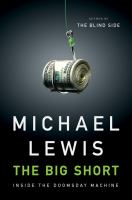 As I write this, our Congress is debating our national financial future. Our President and the Speaker of the House have gone on television to state their viewpoints of what needs to be done in this crisis. Libraries have traditional sought to educate the average person to be informed, participating citizens and voters. Toward that aim, we have newspapers from a variety of places with a variety of viewpoints; compare a few to dig out the facts and make up your own mind. Try the Washington Post versus the New York Times. We also have magazines such as the US News and World Report and the Congressional Digest. We have databases that you can reach from our homepage with many more newspapers and magazines. And for a deeper, more thoughtful insight into the issues of the day, try a book. For insight into the current financial crisis where decisions will affect each and every one of us; read The Big Short : Inside the Doomsday Machine by Michael Lewis or How the West Was Lost: 50 Years of Economic Folly by Dambisa Moyo. A bestseller is Reckless Endangerment : how outsized ambition, greed and corruption led to economic armageddon by Gretchen Morgenson. Libraries across the country have computers for public use to allow access to information about current issues of the day. From our homepage you can find useful links that are organized by the Dewey Decimal System. Government is 300. I recommend the website http://www.votesmart.org/ to find your representatives and how they vote on key issues. It is up to every one of us to keep informed, and to let our representatives know how we would like them to vote.
As I write this, our Congress is debating our national financial future. Our President and the Speaker of the House have gone on television to state their viewpoints of what needs to be done in this crisis. Libraries have traditional sought to educate the average person to be informed, participating citizens and voters. Toward that aim, we have newspapers from a variety of places with a variety of viewpoints; compare a few to dig out the facts and make up your own mind. Try the Washington Post versus the New York Times. We also have magazines such as the US News and World Report and the Congressional Digest. We have databases that you can reach from our homepage with many more newspapers and magazines. And for a deeper, more thoughtful insight into the issues of the day, try a book. For insight into the current financial crisis where decisions will affect each and every one of us; read The Big Short : Inside the Doomsday Machine by Michael Lewis or How the West Was Lost: 50 Years of Economic Folly by Dambisa Moyo. A bestseller is Reckless Endangerment : how outsized ambition, greed and corruption led to economic armageddon by Gretchen Morgenson. Libraries across the country have computers for public use to allow access to information about current issues of the day. From our homepage you can find useful links that are organized by the Dewey Decimal System. Government is 300. I recommend the website http://www.votesmart.org/ to find your representatives and how they vote on key issues. It is up to every one of us to keep informed, and to let our representatives know how we would like them to vote.
Phyllis Rogan, Reference Librarian
Steele Memorial Library
